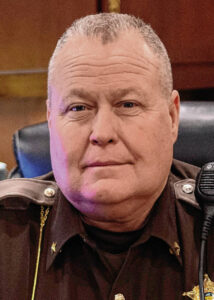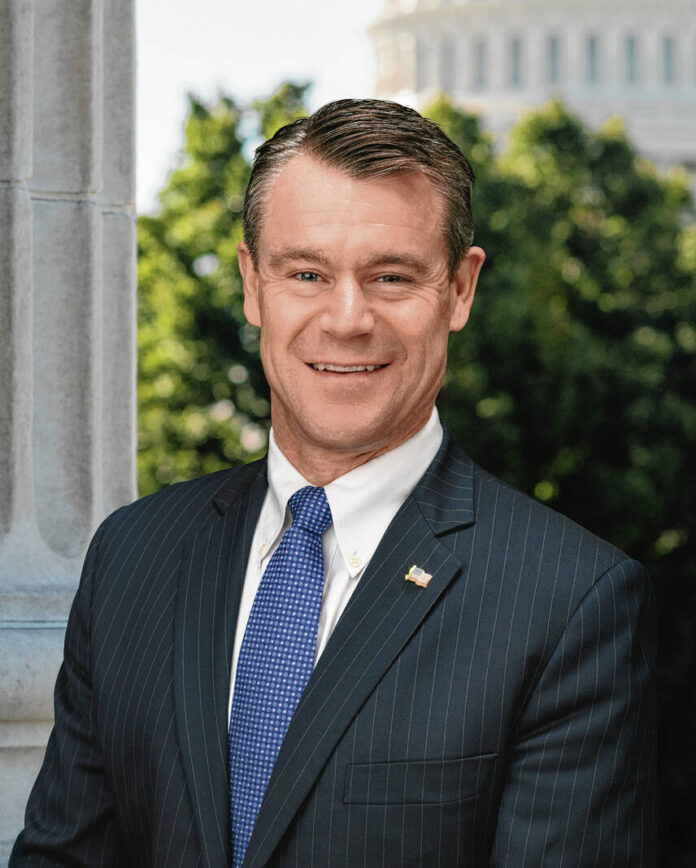Indiana U.S. Sen. Todd Young authored and passed legislation that could help provide mental health services to first responders nationwide.
The Fighting Post-Traumatic Stress Disorder (PTSD) Act of 2023 is bipartisan legislation that would establish mental health programs for America’s first responders, which include police, firefighters, 911 personnel and emergency medical responders.
Young authored the bill along with Sen. Chuck Grassley, R-Iowa. It passed the U.S. Senate unanimously on March 2. Young told the Daily Journal he authored the bill after he saw a need for more mental health support when talking to public safety officials around the state.
“Departments and their officers are stressed and strained and overworked. Many of them have been dealing with mental health challenges and you know, frankly, they asked me for help,” Young said.
Work on helping first responders’ mental health started for Young not long after he began his first term in the Senate in 2017. In 2017, he co-led, with former U.S. Sen. Joe Donnelly, the Law Enforcement Mental Health and Wellness Act, or LEMHW, which President Donald Trump signed into law in January 2018.
That bill required the director of the Department of Justice’s Office of Community Oriented Policing Services, or COPS, to form a report on the impact of the Department of Defense and Veterans Affairs’ mental health practices and how similar programs could be extended to law enforcement officers.
COPS released its report in March 2019, and the findings suggested that crisis lines, mental health checks, and peer and family support programs could be components to providing mental health care. The Fighting PTSD Act builds upon these findings, initiating the first step in developing a national program for helping public safety officers.
The Fighting PTSD Act would require the U.S. Attorney General, in conjunction with the COPS Office Director, to propose an evidence-based program to Congress for making nationwide treatment available to first responders dealing with job-related PTSD. These programs would be similar to services currently available to military personnel who develop PTSD or acute stress disorders.
This proposal would include specific legislative proposals as well as “an estimate of the amount of annual appropriations necessary for administering each proposed program,” according to the bill. When the Justice Department submits its legislative recommendations to Congress, those recommendations would also include estimated costs.
The bill also requires the Justice Department to consult with stakeholders, including public safety officer organizations, in developing the program. The program established would be available to serve first responders in communities of all sizes across the country.
Young said his involvement in creating a program will not stop with just passing the legislation into law. His job is to continue to see it through, while also giving the Justice Department flexibility to establish what they need.
“We also want to make sure that valuable taxpayer dollars that we allocate to the important cause, go as far as possible,” Young said. “And my job is to authorize the Justice Department to carry out this program and give them some initial resourcing to do so and then oversee how they implement this program.”
The bill will next need approval from the U.S. House of Representatives, which Young said he’s optimistic about securing because of its unanimous support in the Senate. Then it would go to President Joe Biden to be signed into law, and Young also said he is optimistic about the president’s support.
The Fighting PTSD Act is supported by several public safety organizations across Indiana, including the Indiana Fraternal Order of Police, Indiana Sheriffs’ Association, the Professional Firefighters Union of Indiana, the Indiana Firefighters Association, the Indiana EMS Association and more.
Locally, Johnson County Sheriff Duane Burgess publicly backed Young’s bill.

“It’s a great program because sometimes we forget about all of our first responders and their mental health. They see a lot of things that you just cannot erase in your mind, and that sticks with them,” Burgess said.
The Johnson County Sheriff’s Office is leading the way in terms of focusing on mental health with its Crisis Intervention Team, or CIT. CIT deputies respond specifically to mental health calls around the county, and other officers in departments around the county have received CIT training as well, including in Greenwood and Franklin. The program as a whole creates more “well-rounded” officers, Burgess said.
Johnson County CIT provides mental health services to first responders too, Burgess said.
“When we have a tragic incident, or any type of death, or anything that’s involving just something that’s going to be on that public safety worker’s mind, we have a team that responds as well,” Burgess said. “We’ve got the avenue to find the right person, that they will go talk to.”
Young, who lives in Johnson County, commended Burgess and his efforts to focus on mental health.
“I know he is doing whatever he can at the local level to help those citizens who struggle with mental health issues, and trying to help those officers on his team, of course, deal with whatever challenges they might be dealing with as a result of these efforts,” Young said.
With public safety offices struggling nationwide and locally to recruit and retain personnel, focusing on providing more mental support is important in that scope, Young said.
“I think it’s broadly understood that firefighters, EMTs, 911 dispatchers and police officers lead stressful lives. It’s inherent in the nature of the work, but you know, these aren’t normal times,” Young said.
“… They want assurance that if they sign up to this line of work, they’ll not only be respected and their families will be taken care of, but their health will also be tended to. It’s important that we send this message to would-be public servants at a time when we need more of them.”





